Global challenges and issues in our communities cannot be solved by government and philanthropy alone. I believe that companies have an opportunity and dare I say, a responsibility, to operate from a place of higher Purpose, with the intent of creating a positive lasting impact in our communities or the world.
For companies with lagging company culture and employee morale at an all-time low, a place to start can be looking within your company to the good that you can create in your community.
The ‘reward’ to the company, of having an embedded higher Purpose is: improved company culture, happier employees, customer allegiance that can’t be bought, and improved profitability. And the biggest ‘reward’ is the greater good created in the community or the world.
But not so fast, only if you’re truly committed to making a difference and committed to the process.
Creating a higher Purpose is not a marketing ploy, a quick solution to fixing company culture, or a quick win for media exposure. Make no mistake it’s thinking from the inside out.
I’ve come to this place, from working with companies on their Purpose, and discovering how they can create lasting positive impact using a values-aligned framework. And drawing on my life’s work as a philanthropist, being employed in non-profit, government, and businesses of all sizes and sectors, volunteering through the decades, and owning 8 businesses spanning five decades. I’ve seen firsthand how leading with a higher Purpose and the greater good they are creating, can positively impact the business and beyond.
While some may say that this sounds like ‘giving back’ or donating to charitable causes, I look at it differently. Higher Purpose is more than giving back. It’s a deeply embedded Purpose beyond profit, and is the basis for why the business exists at a deep core level. It’s embedded into their company DNA and company culture. Many bright minds over the past two decades have contributed time and research to this like Harvard Business and McKinsey & Company to name just two.

Higher Purpose Sparks Magic Inside and Outside the Company
When a business has a higher Purpose, a reason to exist beyond making money, to exist for reasons bigger than themselves, to truly desire to make a difference in some aspect of social or environmental benefit … this is the place where magic happens, inside and outside the company.
- Employees are happier because they feel like they are contributing to the greater good and it gives them meaning beyond their paycheque. Often there is an alignment of values between the individual and the employer. In a 2022 press release by Deloitte they note “A Deloitte survey of over 4,000 respondents* found that over half of employees (62%) consider an organization’s Purpose before deciding to join, with over a third (36%) saying that an organization’s purpose was just as important as their salary and benefits package.”
- When customers and clients share similar beliefs about the social or environmental benefit the company is creating, the customers hop on board as evangelists – and you can’t pay for that kind of brand allegiance and organic marketing! Patagonia is the poster child for this. In fact, a Zeno Group global study revealed consumers are four to six times more likely to purchase protect and champion Purpose-driven companies.
- The community and the world benefit through partnership development and alignment between the for-profit and non-profit sectors to help solve the issue you’re desiring to make a change on.
Purpose, when done right with a values-aligned framework, is really about creating social and economic benefits for your community, practicing social responsibility, and operating sustainably.

From my perspective, there are two ‘BUCKETS’ of businesses:
- BUCKET A: Ones that are created for the sole purpose of addressing and benefitting a social or environmental need. They are often product-based. This benefit is why they exist.
- BUCKET B: Ones that are created to solve a customer need, and deliver a service, with no direct benefit to society or the environment. They may donate to the charitable sector, but typically it’s not ‘why’ they exist unless they have a stated Higher Purpose and greater good.
To illustrate this, here are a few business examples:

A ‘BUCKET A’ example of a product-based business created to solve a problem, is Project Hive Pet Company, a dog treat company.
Project Hive Pet Company Purpose and the problem they are tackling is the threat of the extinction of bees which directly affects our food security. They focus on the preservation, protection, and awareness of bees – it just so happens they manufacture dog treats using honey as a key ingredient, and dog toys, to spread their message and make a difference.
- Their goal is to establish 50 million square feet of wildflower pollinator habitat by 2025 to nourish and sustain bees. (In case you wondered, every acre of wildflower land provides nutritious habitat for 20,000-80,000 bees.)
- In their mission to go beyond creating awareness of the plight of bees: every purchase directly helps establish healthy bee habitats through non-profit partnerships – The Bee and Butterfly Habitat Fund and the Canadian Honey Council.
- They operate with sustainability in mind: being carbon neutral; products require little to no packaging; they are certified BCorp; and were founded as a Public Benefit Company.
There are loads of examples of product-based businesses that started with a conviction and Purpose to solve an issue through the manufacture and sale of their product. The degree to which they carry out the positive impact at a core level varies wildly. Generally, companies that have achieved BCorp certification are businesses that are “meeting high standards of verified performance, accountability, and transparency on factors from employee benefits and charitable giving to supply chain practices and input materials.”

Another ‘BUCKET A’ example is Big Wheel Burger, Canada’s first zero-waste, carbon-neutral fast food restaurant, headquartered in Victoria, BC, Canada, with locations spread across Vancouver Island.
Big Wheel Burger’s mission is to build a better community for everyone to live, work, play and thrive – they just so happen to make burgers to feed people. This Purpose flows through their commitment to social benefit, sustainability efforts, and the economic benefit to the community.
At their onset, founder Calen McNeil, identified three issues:
- Fast food should be healthy, conscious food, and locally sourced. Buy local, shop local, support local.
- Sustainability is key.
- Food security is a major issue for many individuals. Doing well by doing good means they can help more people thrive.
“By taking responsibility for our impact and choices, we strive to offer a classic burger joint experience that doesn’t harm the environment, our customers, or our communities. We hope this sets an example for other businesses to follow.” Big Wheel Burger
Their commitment to the community, includes:
- the Big Wheel Burger Community Foundation, launched in 2018, focuses on the relief of poverty through the promotion of food security. They fund organizations and non-profits working on values-aligned projects. And assists families facing financial challenges.
- a partnership with Food Eco District (FED) using compost (from recycled consumer waste) to build vegetable gardens. And Big Wheel’s donations have helped to plant more than 500 backyard gardens for people with food insecurity.
- through community collaboration, they partner with local charities to raise funds through in-store specials.
From the onset, Big Wheel Burger has been centred around sustainability:
- responsibly sourcing local suppliers (from bread, to eggs, bacon, and beverages).
- waste management efforts: less than 1% of waste materials make it to the landfill because food waste and customer packaging materials are composted (except for beverage containers and supplier packaging which are recycled).
- composted materials are then turned into compost, then used for the garden which supplies fresh herbs and produce to the restaurants and feeds the compost for the Food Eco District gardens (see below).
- cooking oil is converted into biodiesel which fuels the Big Wheel Burger cargo van.
- staff are trained in sustainability as part of their onboarding process, and continued education.
So if you live on Vancouver Island, consider supporting this rockstar burger joint with deep roots in Purpose and the community! Locations are listed here.
An Accountant firm would be in ‘BUCKET B’. They solve a customer need, deliver a service, it’s why they started the company. But unless they’ve made a conscious decision to operate from a stated higher Purpose to benefit a social or environmental need, they’re just a service provider.
It’s ‘easy’ for a company to write a cheque and donate a sum of money to the cause of their choosing in the charitable sector. When I say ‘easy’ I mean, from the perspective of writing the cheque, feeling good, and moving on to the next thing.
But when a company moves past philanthropy as a single tool for community impact and makes the conscious decision to have a higher Purpose, and involve employees, customers and the community the benefits are far-reaching.
They will create social benefits for their employee culture and community; often discover ways to be more socially responsible and sustainable; provide economic benefit to the community; and be rewarded with higher profitability.
The key to solving challenges in our communities isn’t in just writing a cheque (although no charity is going to turn down cash), but consider a more embedded approach where you’re only contributing to those that align with your corporate values and Purpose. Remember to get your employees involved in all ways to further the corporate Purpose, and watch your employee engagement and happiness soar. In turn, over time, you’ll see your bottom line increase too. And if you have a company Purpose, but your employees, customers and the community don’t know it, feel it, and see it … then it’s likely time for a refresh!
Need help to start or evolve your corporate Purpose journey? Visit the Business 4 Social Good website.


